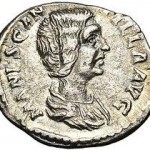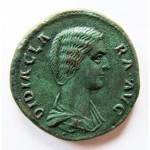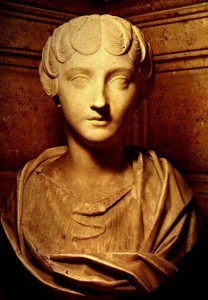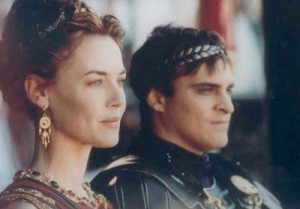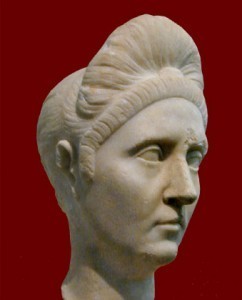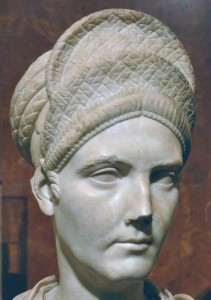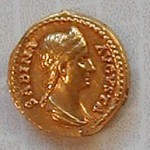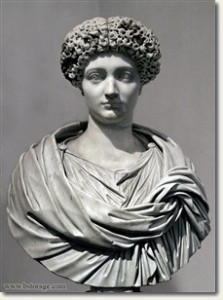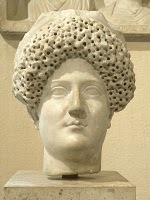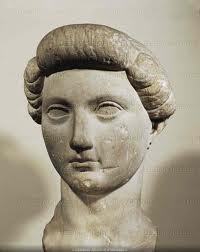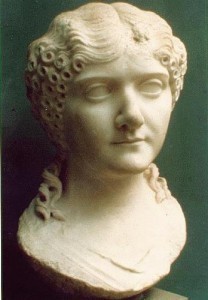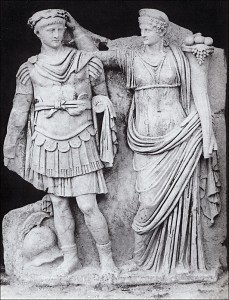Tansy Rayner Roberts's Blog, page 131
October 1, 2011
Matrons of Awesome XIII: Between the Dynasties
This one's short. This is all we have about these three, apart from a coin or two that just confirms the below information.
Wife of Didius Julianus, who came the throne suddenly and left equally suddenly, in a pool of blood. He ruled for 30 days or so, and took the time to give his wife and daughter the title Augusta.
Daughter of Didius Julianus. When he died in the aforementioned pool of blood, the supporters of his successor Pertinax went after Manlia Scantilla and Didia Clara… and removed the title of Augusta from Didia Clara. Yep, that's all they did.
A long way from murdering Caligula's baby in her bed, to end his biological line…
I find it awfully interesting that Manlia Scantilla is not said to have lost her title, but Didia Clara is. This led me to a vital point in my thesis, about the meaning of Augusta, which I won't bore you with right now. But it seems evident to me that Didia Clara being of childbearing age made a big difference.
40. Titiana
Wife of Pertinax. Didn't get to be Augusta. Pertinax also refused to give his son the traditional "heir" title of Caesar, saying "When he has earned it." We presume that this is also the reason why Titiana didn't get to be Augusta straight away.
She might have earned the title in time, of course, but they didn't have much in the way of time. Pertinax and his family lasted longer than the Didii Julianuses, but not by much. A new dynasty was on the horizon, and they carried a big sword…
=====
 The Matrons of Awesome series was originally posted on Livejournal (LJ user: cassiphone) in March 2006 for Women's History Month.
The Matrons of Awesome series was originally posted on Livejournal (LJ user: cassiphone) in March 2006 for Women's History Month.
I'm reprinting the (reworked) series as part of my Rock The Romanpunk week in celebration of my short story collection, Love and Romanpunk, which was published by Twelfth Planet Press earlier this year and is now available globally as an e-book as well as a pretty imperial purple print edition. Thanks to Wizard's Tower Bookstore you can also now purchase it for the Kindle.
September 30, 2011
Matrons of Awesome Part XII – Good Wives and the Gladiators
When Antoninus Pius was adopted as Hadrian's heir, he already had a wife and daughter, both called Faustina.
A condition of Antoninus' adoption was that he in turn adopt two men chosen by Hadrian: Marcus Aurelius and Lucius Verus. But Marcus Aurelius and Faustina also managed to break the adoptive tradition of the emperors by having a son of their own. And what a son! But let's not get ahead of ourselves…
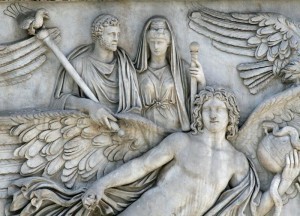
the apotheosis of Antoninus Pius and Faustina
33. Faustina MajorAntoninus's wife Faustina didn't make much of an impact on the imperial family, as she died within a couple of years of her husband's reign. She is notable, however, for getting the title of Augusta almost immediately, making her the first imperial wife since Domitia who didn't have to wait several years for this honour.
Faustina's posthumous life is more memorable – she was deified by her husband, and became something of a patron goddess for the whole Antonine family, with an unprecedented number of coin types released in her honour.
A temple was built to her – not wholly unusual for a Roman diva (deified woman – as distinct from dea, which means goddess), but the fact that it was built in the middle of the forum was highly out of the ordinary for any new god.
The temple still stands there today – it goes by the name of the Temple of Antoninus and Faustina, as his name was added after his own death and deification, but it is important to remember that this temple, situated in the prime real estate of the Forum, epicentre of Rome, was originally built to honour a woman.
Antoninus also set up a foundation in Faustina's memory called the puellae faustinianae, which provided dowries for orphan girls.
Like Sabina – only more so – Faustina was born into the imperial family, and that would have given her a strong grounding in what was expected of an imperial wife. Which was handy, because it was her husband, Marcus Aurelius, who was to her father, Antoninus Pius, when he died. (Lucius Verus kind of tagged along as a co-emperor for a while, but sub-emperor may be a more appropriate term)
It was a toss-up originally as to which heir Faustina, the only surviving child of Antoninus and Faustina Major, would marry: Marcus Aurelius or Lucius Verus. It must be assumed that the marriage increased Marcus' chances of being bumped up to prime rather than spare heir. Poor old Lucius had to wait until Marcus and Faustina's own daughter Lucilla grew up before he got himself an imperial daughter for a wife…
But this is Faustina Minor's story. The most significant thing about Faustina was her fertility. After so many pre-grown adult heirs and adoptions, it came as something of a shock to Roman society to have an imperial wife who was not only fertile, but positively abundant.
Not since the reign of Claudius had an imperial wife actually produced a male heir – and the only natural sons who had ever inherited the imperial throne from their father were Titus and Domitian, who had both been adults when their father became emperor.
It is hardly surprising that, upon giving birth to twin sons after something like four daughters, Faustina Minor was celebrated in Rome as something akin to a goddess of plenty. Her portrait types changed with every child born to her, and she had a wealth of public images commissioned of her, from statues to coins.
Faustina was known for travelling with her imperial husband when he went abroad with the army. She was even given a new honorific title, invented just for her: Mater Castrorum, Mother of the Camp.
One of Faustina's twin boys died at the age of four, but the other grew up to inherit the Empire. It was something of a red letter day, given that no emperor had ever before had a son born during his reign who actually grew up to be emperor. Not a single one. Unfortunately for Rome, the particular emperor that this son grew up to be was Commodus. Remember him from the movie Gladiator? Yep, that was pretty much him. Only he held on to the throne for much longer than the Joaquin Phoenix version, and was just a little bit crazier. No, really. Caligula and Nero's love child kind of crazy.
[Actually, if you believe half of the stories we have about Commodus, we're talking Arkham Asylum levels of crazy. You can draw a lot of parallels between the literary portraits of the more flamboyant Roman Emperors, and comic book supervillains. Where was Batman when Rome needed him? And why did Rome attract so many erratic young rulers? Was it genuine mental illness, the lead in the pipes, power going to the heads of over-privileged young men, or just a whole lot of bad press? Sadly we'll never know.]
Like Plotina, Faustina Minor's popular reputation was retroactively damaged because of her son. In an attempt to explain how the son of Marcus Aurelius and grandson of Antoninus Pius (both very good, mostly sensible emperors) could turn out so gratuitously loopy, a rumour was spread that Faustina had conceived her son by bonking gladiators. Though, it has to be said, that comes from one of the most disreputable literary sources that we have.
Again, think the movie Gladiator. Only… well, not. The characterisation and pretty outfits were just fine, but the bit about her (illegitimate!) son inheriting from Commodus… nuh. Lucilla was the daughter of Marcus Aurelius and Faustina Minor. When she came of age, she was married to her father's co-emperor Lucius Verus, and given the title Augusta. She had possibly two children, probably both female.
When Lucius Verus died, Marcus Aurelius (now ruling solo and totally not upset about it) chose some ordinary senator to be Lucilla's second husband. Both Lucilla and her mum were furious about this, as they considered the man to be unworthy of "an Augusta who is daughter of an Augusta."
When Lucilla's brother Commodus took over the throne and started all his dramatic "fighting as a gladiator, dressing up as Hercules, not persecuting Christians, demanding he be worshipped as a god, slutting around instead of attending to the paperwork" antics, Lucilla found herself losing even more status.
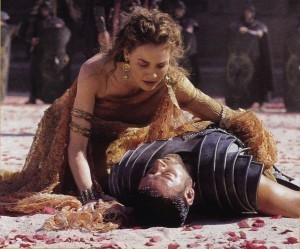 This was particularly due to the fact that a new Augusta – Commodus' wife Crispina – had entered the imperial family, and was pulling rank on the imperial sister. For once, the wife came up trumps.
This was particularly due to the fact that a new Augusta – Commodus' wife Crispina – had entered the imperial family, and was pulling rank on the imperial sister. For once, the wife came up trumps.
By all accounts, Lucilla was involved in various plots against the emperor, notably one with her stepson which seriously backfired. She was exiled and soon after executed by her brother.
Unlike her mother, there are not even the vaguest rumours that Lucilla had sex with gladiators. Not even ones that looked like Russell Crowe. Sorry about that.
There is a very dim possibility, however, that she had sex with her brother. Then again, didn't everyone?
36. Crispina
Despite being an Augusta, Crispina is pretty much a footnote in the history of Commodus. He married her, made her Augusta, exiled her and executed her, in that order. There are a few statues and coins around, but we don't know much beyond that.
37. Marcia
Marcia was Commodus' mistress – the fact that history remembers her name at all is pretty stunning considering just how many people Commodus is rumoured to have shagged. She is memorable because, like Domitia Longina, she was crucial to the plot which successfully assassinated her emperor.
I always remember a quote (though not sure where it comes from, or if it's Officially Historical) that Marcia served her master well for many years, then served the empire well by killing him. Basically, she poisoned him when he was sleepy but it wasn't quite strong enough to do the job, so she and the other conspirators arranged for a friendly local wrestler to pop by and strangle him.
Which is probably the way he would have wanted to go.
=====
 The Matrons of Awesome series was originally posted on Livejournal (LJ user: cassiphone) in March 2006 for Women's History Month.
The Matrons of Awesome series was originally posted on Livejournal (LJ user: cassiphone) in March 2006 for Women's History Month.
I'm reprinting the (reworked) series as part of my Rock The Romanpunk week in celebration of my short story collection, Love and Romanpunk, which was published by Twelfth Planet Press earlier this year and is now available globally as an e-book as well as a pretty imperial purple print edition. Thanks to Wizard's Tower Bookstore you can also now purchase it for the Kindle.
Supersizers Rock the Romanpunk
Roman cooking, Vestal Virgins and the making of garum!
Matrons of Awesome Part XI – Trajan's Matrons
(or: "disgustingly good women of the Adoptive Era.")
(or: "of all the PR in all the world, these women had the best that money could buy")
After the Flavians dynasty died with Domitian, elderly Nerva took the Empire. He didn't have a wife or children, so he chose the ridiculously sensible route of just picking an adult male who he thought would do a good job, and making him the heir. That was Trajan, a childless forty-something general with a good head on his shoulders.
Sadly, without a focus on dynastic inheritance, there was no place for the public image of women in Nerva's reign. Let's move on to Trajan.
It was during the reign of Trajan that many of the historical sources about the Julio-Claudians were actually written. There's a popular theory that the Julio-Claudian women were dealt with so atrociously in the sources as sluts, harridans and poisoners in order to show how modest, virtuous and generally wonderful the women of Trajan's family were.
So if you're looking for the juicy stuff, you might want to go back to some of the earlier entries…
Plotina was middle aged when her husband Trajan became emperor. Luckily for her, he had no interest in siring a biological heir, so her marriage was not in danger from any wide-hipped young temptresses (for some reason I keep expecting this to happen, ala Henry VIII, but the adoption laws of Rome actually protected wives from being discarded in the name of fertility).
Plotina was a good woman. No, really. Modest, chaste. All those things. We have scads of information (well, compared to other Roman women) about how good she was, and what a non-slutty, non-poisonous, non-greedy wife she was when Trajan was alive.
However, as soon as Trajan died, Plotina's literary portrayal changed quickly. In Dio in particular (one of our main historical sources) it's like a switch has been thrown, and she goes overnight from a paragon of wifely virtue to a scheming, ambitious mother figure in the manner of Agrippina.
Most people with a vague knowlege of this era know how the thread goes. Nerva adopted adult Trajan, who adopted adult Hadrian, la la la. Except Trajan didn't adopt Hadrian at all. He never got around to it. He let Hadrian marry Trajan's great-niece Sabina, which could be read as a move towards creating a dynastic line, but he never formally adopted Hadrian. He might have had someone else in mind, for all we know.
When Trajan died, Plotina went to work. She arranged the adoption papers, and retroactively signed them on Trajan's behalf. Some of the sources get a bit excitable about this, claiming that she did it out of lurve for Hadrian, because that's the only motive a woman could have in the Roman world?
What crap. Isn't it far more likely that she knew Trajan meant Hadrian for the position, and had been nagging him for months to formalise it, and then had to roll her sleeves up when the time came because Trajan hadn't bothered?
Anyway, Plotina was quite non-threatening as an imperial "mother" goes. When she died, Hadrian said that she made it easy for him by never asking him for anything he felt obliged to refuse her.
There are worse eulogies.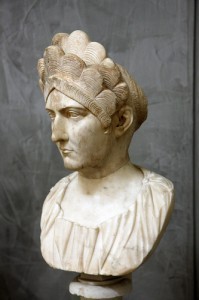 30. Marciana
30. Marciana
Marciana was Trajan's sister. Many historians ignore her significance, preferring to concentrate mainly on Plotina. But Marciana and Plotina had, in fact, exactly the same social position.
Yep. Because Romans still didn't have the of an automatic status for an imperial wife. There were about ten words for 'emperor' and none for 'emperor's wife'. Historians talk a lot about empresses, but that's a cultural concept borrowed from elsewhere. The Romans did not have empresses. The closest they had was the title 'Augusta,' and that was something bestowed upon women by the Senate and the Emperor. More importantly, it wasn't only given to imperial wives – as we've seen so far, it's as likely to be given to mums, sisters and even daughters.
An imperial wife only had as much status as her husband chose to allow her, as did other women of the imperial family.
Trajan borrowed a leaf out of Augustus' book and gave the same status to his sister as to his wife. He offered them both the title Augusta at the same time, and they both refused it out of modesty. (later, they accepted it at the same time and all was well)
Pliny the Younger, professional toady, wrote a gushing panegyric (sucking up letter) to Trajan, which includes huge slushy tracts about how marvellous Plotina and Marciana both are. He declares that since they share the same status, they are marvellously good and moral for not getting into jelly-laden catfights on the front lawn of the Palatine.
I'm paraphrasing, obviously.
At least one historian suggested Pliny was implicitly criticising Trajan for undermining Plotina's "rights" as an imperial wife, by making her share status with Marciana instead of letting her get on with being top bitch. Which is stupid. If you're going to implicitly criticise your boss, a Panegyric is not the way to go about it. Even an ironic one.
Also, Pliny the Younger wouldn't understand irony if it invited him to the baths.
When Marciana died, well into the reign of her brother Trajan, her daughter Matidia was given the title Augusta, and basically slotted into her mother's position as "equal-status companion to Plotina."
Her mother was also deified, and coins were released in honour of Matidia Augusta, daughter of Diva Marciana. This is significant because these are coins celebrating a mother and daughter of the imperial family, with no mention of the emperor. The only precedent for this were the Diva Poppaea/ Diva Claudia Virgo coins of Nero's reign, but these Marciana/Matidia coins are more significant because one of the women on them is still alive.
Sadly, Matidia didn't do anything else of note except having a couple of daughters, one of whom – Sabina – was married at the age of 12 to a distant cousin of Trajan called Hadrian.
And that, my friends, is what we call foreshadowing.
The state of the marriage between Hadrian and Sabina is controversial. Some sources portray her (when they bother to mention her at all) as a jealous woman who ensured she never bore Hadrian a child because of his love for men. Others suggest that her relationship with both Hadrian and his male lover Antinous was cordial – both Sabina and Antinous joined Hadrian on many of his travels, something one would not expect from a wife whose marriage was not at least friendly in the platonic sense.
Indeed, when Antinous died (and had cities and stars named after him, temples built in his honour, etc.), Hadrian mentioned the friendship that his lover had shared Sabina.
There are few other mentions of Sabina in history, which is unfortunate given that she had a longer public career than any other imperial woman of this Adoptive era. We know that Sabina did not receive the title Augusta until the age of forty, despite being in her twenties when her husband became Emperor. Some historians have seized upon this as being significant evidence of Hadrian's disdain of her – though it is more likely that he was trying to preserve the 'mature' connotations of the title, which she received at a similar age as had her mother, grandmother and her great aunt-in-law Plotina. That, and the title Augusta has often been associated with the emperor's title Pater Patriae, which Hadrian only accepted on his own behalf in the same year that Sabina became Augusta.
Like Antinous, Sabina predeceased Hadrian, and he deified her. Unlike Antinous, her deification became part of official state propaganda. When Hadrian adopted his own adult male heir, Antoninus Pius, Diva Sabina was included in Antoninus' own propaganda as his "mother."
I know. They're a bit dull, the Adoptive Era women, aren't they? It's all modest draperies and not poisoning each other, I'm afraid. There is a vague rumour that Sabina pushed Antinous into the Nile, but it's not very credible.
Let's take a moment though to admire the fierce hairstyles of this era.
=====
 The Matrons of Awesome series was originally posted on Livejournal (LJ user: cassiphone) in March 2006 for Women's History Month.
The Matrons of Awesome series was originally posted on Livejournal (LJ user: cassiphone) in March 2006 for Women's History Month.
I'm reprinting the (reworked) series as part of my Rock The Romanpunk week in celebration of my short story collection, Love and Romanpunk, which was published by Twelfth Planet Press earlier this year and is now available globally as an e-book as well as a pretty imperial purple print edition. Thanks to Wizard's Tower Bookstore you can also now purchase it for the Kindle.
September 29, 2011
Matrons of Awesome: Part X – Flavian Ladies
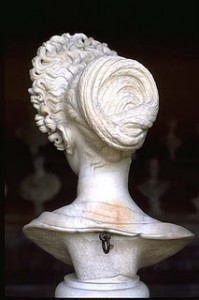 Nero was the last of the Julio-Claudians. After he died, Rome had the Year of Four Emperors, in which various blokes (Otho, Galba, Vitellius) tried to grab the throne.
Nero was the last of the Julio-Claudians. After he died, Rome had the Year of Four Emperors, in which various blokes (Otho, Galba, Vitellius) tried to grab the throne.
Finally, Vespasian, a pragmatic military man, marched in and got himself settled in power. He, with his two adult sons Titus and Domitian, comprised the Flavian dynasty.
The one thing Flavian women are famous for, above all else, is the distinctive hairstyle of the era.
My favourite example of the Flavian "curled bogan fringe" is on this bust of an anonymous Flavian Lady. She's a peach, isn't she?
 If you're in Rome, you'll find her in a window at the Musei Capitolini, the only well-lit piece of art in the whole place. Go and admire her!
If you're in Rome, you'll find her in a window at the Musei Capitolini, the only well-lit piece of art in the whole place. Go and admire her!
Also, it's amazing that they managed to get those curled fringes so high, two thousand years before hair product was invented. Go Flavians!
23. Sextilia
Vitellius, one of the so-quick-you-missed-it in betweeny emperors, gave his mother the title Augusta so he could support his claim to the throne (which up until that point was pretty much 'I got here first, ner ner ner') by being a "son of an Augusta."
Sextilia was not overly impressed with her son's achievements. When she heard he was calling himself Caesar (now more of a title and job description than a family name) she said, "I gave birth to a Vitellius, not a Caesar," cutting as only a mother can be.
According to the same people who brought you "Livia poisoned everybody," "Caligula bonked his sisters," and "Nero fancied his own mum," Vitellius murdered Sextilia, either assisting her suicide or helping her along to fulfil a prophecy that his reign would only be successful if he outlived his mum.
It didn't work. He ruled only as long as it took Vespasian to get to Rome and whip Vitellius' arse out of there.
My love for this particular historical woman is entirely due to The Course of Honour by Lindsey Davis, a mostly fictional retelling of the back-story that explains why Vespasian, new emperor of Rome, was shacked up with a freedwoman (ex-slave) mistress rather than marrying some senatorial bint who would give him posh babies.
For a start, he didn't need babies. Vespasian had two adult sons from his first marriage who were all set to be his heirs, and now he was a widower (and, you know, ruler of the world) he felt that he could do whatever the hell he wanted in his private life.
What he wanted was Caenis Antonia. She seems to have been a sensible, intelligent woman who was Vespasian's partner and advisor in the manner of Livia to Augustus. He couldn't marry her legally because you couldn't if more than one rank separated you – a senatorial class man could marry a middle class woman, but not a citizen-class woman. And freedwoman was one rank below citizen.
There are two historical tidbits about Caenis. The first concerns the time that she was a slave, a secretary in the household of Antonia (yes, that Antonia) When Antonia discovered the Sejanus conspiracy, she dictated a letter to the emperor, telling him of the plot and the danger to his life. Once she had finished dictating, she asked her secretary, Caenis, to forget everything she had just heard.
Caenis replied that she was physically incapable of forgetting anything. So, also tactless.
The second anecdote concerns Vespasian's younger son Domitian, who was 20 when his father became emperor. He once snubbed Caenis by refusing to take her hand in greeting, and this was held up as an example of what an utter bastard he was.
Which is interesting, considering that Vespasian's relationship with Caenis was not something you might expect the generally misogynist historians to approve of. But there is no breath of scandal about this woman – just a general impression that she was good for Vespasian, and he loved her.
And The Course of Honour by Lindsey Davis is the best historical romance ever. Just saying.
Titus shared his father's taste in inappropriate women – and he was far less discreet about it.
Berenice was a Judaean queen, daughter of Herod Agrippa and great-granddaughter of Herod the Great. She was exotic, wealthy and had a substantial army at her disposal. Sounds familiar? Oh, yes. She was awfully reminiscent of a certain other foreign queen from Rome's past whose name rhymes with Beopatra.
Titus and Berenice were lovers before his father took power – he was a general during the political and military mess that was the 'Year of Four Emperors', but their relationship took on a new significance once his father took on the imperial throne.
Berenice travelled to Rome to be with Titus, and they lived openly together for some time (he having divorced his wife) but public opinion was very much against them marrying. Not that it was even possible for a Roman citizen to marry a non-Roman in anything other than unofficial terms.
Berenice stuck it out for a long while, even becoming a member of the Imperial Advisory Council, but politics won out, and when Vespasian died and Titus became emperor in 79 CE, he reluctantly sent Berenice away. He never remarried.
Here's the thing – Flavia Domitilla was Vespasian's wife, but she was already dead by the time he came to the throne. Nevertheless, Flavia Domitilla was given a high profile during the reign of her son Titus. She was posthumously given the title of Augusta, and deified. Given that Vespasian was also deified after his death, this made Titus the child of two gods, as well as son of Augustus and Augusta. Nice little status-grabber, that.
The evidence for most of this is numismatic rather than textual (coins, not words), which is problematic because Vespasian also had a daughter called Flavia Domitilla who also died before he came to the throne. So the Diva Domitilla Augusta on the coins could be Titus' sister, not his mother, and this has led to all manner of historical controversy.
Which is dumb in all sorts of ways, because as has been previously established, there was heaps of status in deifying and Augustafying your mum (ie. look at me, son of Augusta!) and no point at all in giving the same honours to your sister. So there.
Titus had a daughter, Julia (she was born long before his family took the Empire, so her name was a coincidence rather than a political statement) whom he promoted throughout his reign as a Good Roman Woman. She was given the title of Augusta while still very young, and appeared on the coinage and in statues. She looks like a teenager with frizzy hair and a wistful expression.
Titus died after only a few years in power, and his brother Domitian became emperor. Julia continued to be a prominent part of her uncle's family public image, despite the fact that he had a wife to represent Roman womanhood.
Indeed, there were rumours that Julia had an affair with Uncle Domitian, and further (less historically verifiable) rumours that her death was due to a botched abortion.
She certainly died young, and Domitian deified her. Various historical sources have mentioned the rumours about Julia's relationship with her uncle, but they are surprisingly non-judgemental towards her. She is not blamed or described in any negative terms (as are, for instance, Agrippina and Messalina, by the same historians). Domitian, generally painted in history as evil, debauched and a Bad Roman Emperor, is blamed for any incestuous impropriety that there might have been.
Makes a change.
Domitian's wife Domitia had to put up with a lot, really. She lost their only living children (a girl and a boy) to childhood illnesses. Her husband was busy being emperor, was bonking his niece (allegedly) and possibly poisoning relatives (Titus did die awfully young…).
All this, and she hadn't even wanted to marry Domitian in the first place. She was married to someone else, and he had "stolen her" from her husband, who was later executed for some mysterious crime or another.
Domitia finally got sick of palace life, and ran away with an actor called Paris. Domitian divorced and exiled her, and had Paris killed. Later, though, he recalled Domitia to his side. They remarried, and were "happy" together until a rebellious plot managed to assassinate Domitian, end his tyrannical rule (Vestal-killer, humph) and generally cheer everyone up.
Domitia was credited with an integral role in the conspiracy, and became just about the only woman in Roman history (well, the first 300 years of the empire which is all I'm prepared to make sweeping statements about) to survive the very end of her imperial dynasty.
Indeed, she stayed on very good terms with the emperors who succeeded Domitian, and continued to be portrayed in public statuary throughout the rest of her life. Which, by all accounts, was quite peaceful and relaxing compared to what had gone on before.
=====
 The Matrons of Awesome series was originally posted on Livejournal (LJ user: cassiphone) in March 2006 for Women's History Month.
The Matrons of Awesome series was originally posted on Livejournal (LJ user: cassiphone) in March 2006 for Women's History Month.
I'm reprinting the (reworked) series as part of my Rock The Romanpunk week in celebration of my short story collection, Love and Romanpunk, which was published by Twelfth Planet Press earlier this year and is now available globally as an e-book as well as a pretty imperial purple print edition. Thanks to Wizard's Tower Bookstore you can also now purchase it for the Kindle.
Bad Emperors are Bad: Men of Rome
Another gem from Rotten Romans. If only I could convince Raeli to love this show as much as she loves Doctor Who, Xena and Bewitched, I would be a very happy woman.
Friday Links Has a Foot in Each World
 Tor.com tells you why you should be watching Fringe in a very non-spoilery-for-the-last-three-seasons way. Alisa and I discussed Olivia and her FBI competence in the recent Galactic Suburbia episode.
Tor.com tells you why you should be watching Fringe in a very non-spoilery-for-the-last-three-seasons way. Alisa and I discussed Olivia and her FBI competence in the recent Galactic Suburbia episode.
Sarah Rees Brennan follows up the #YesGayYA story with a discussion of the Circle of Suck that can happen with the portrayal of minority or diversity issues in fiction, and the various roadblocks to publication.
Paula Guran wrote a moving post about leaving Weird Tales, and posted a link to a fabulous article she wrote about Margaret Brundage, and how sexy artwork of women isn't necessarily an unfeminist thing. I love Brundage's pastel women, and really enjoyed the article.
I already posted most of my Starfire links yesterday, but this one also caught my eye: apparently the problematic portrayal of this superhero was flagged in the office, mostly by women who work at DC (see, there are some!) and a minor change was made as a sop to their complaints. (interesting that it was put to the writer that Kory's past as a slave might explain her sexual behaviour now, and he made the – in my opinion, absolutely correct – decision that it would actually make her seem more of a victim)
Sadly it seems that the complaints were more about Kory being "a slut" than the fact that her new portrayal shows her to be utterly brainless and incapable of remembering her friends or experiencing any emotional variation at all. I have to say the thing that has distressed me more than the comic itself (which is highly problematic) is the way that so few people seem to be able to discuss the issue without using loaded terms such as 'slut' and 'whore.' The problem is not Kory's sexuality, the problem is that she has no character function beyond that.
Trent Jamieson has posted about the Big and the Little, and how combining epic and mundane issues makes for great fiction.
Hark, a Vagrant is tackling one of my favourite classic novels of all times, Wuthering Heights! That is, Blithering Heights. (or as Sarah Rees Brennan retitled it on Twitter, Heathcliff Drowns Puppies.
Love this post about how Doctor Who fandom has embraced the Community parody "Inspector Spacetime" in a massive way. Oh, Doctor Who fandom. Don't ever change.
Matrons of Awesome Part IX – Forgotten Daughters, Brigitte Bardot, and Claudian Goddesses.
Some short ones this time!
We know little about Octavia, daughter of the Emperor Claudius and his doomed wife Messalina, her except that she was used and abused quite outrageously in service to the imperial family.
As a teenager, she was married to her stepbrother/adopted brother Nero, in order to further promote his role as her father's heir, ahead of her own brother Brittannicus. Mostly, Nero ignored her, which was the best outcome for everyone.
When her father died (cough, poison mushrooms, cough), Octavia found herself no better off than she had been before – except that now, the husband who was ignoring her was the emperor. It was Nero's mother Agrippina, not his wife, who stood at his side as consort. Various exotic mistresses filled Nero's bed, and his mother filled his heart. There was no room for anyone else. Then her brother Brittannicus was poisoned, and Octavia was left alone.
Nero wanted to divorce Octavia, but hadn't realised just how popular she was with the ordinary people of Rome. There was an outcry, and Nero dropped the idea quickly. Instead, he framed her for adultery, and had her exiled, then executed.
Seneca, one of Nero's chief advisors, wrote a tragedy, "Octavia," which is particularly notable for the vicious caricature it makes of Agrippina's character. In fact, Agrippina had fought for Nero to treat his wife more kindly, and to stay married to her. Though to be fair this was probably because she feared what might happen if Nero started choosing his own brides.
20. Claudia Antonia
Antonia was Octavia's eldest sister, daughter of Claudius to one of his pre-Messalina wives. There is only one story told about Antonia. Towards the end of his life, having been divorced, widowed, etc. several times over, Nero had a bright idea to reclaim the popularity of his first marriage to Octavia by marrying her sister.
Antonia said no.
Nero killed her.
Les Weekends De Neron
21. PoppaeaPoppaea is another Roman woman in the vein of Messalina – the historians tell us she was a slut, and very little else.
She appears in various biblical epic and/or Italian porn films (Claudette Colbert and Brigitte Bardot, yay!) as the decadent Roman slapper who makes the virtuous Christians look oh, so much virtuouser.
Poppaea was Nero's mistress long before she was his wife. According to Tacitus, that well known promoter of female virtue, she was depraved, promiscuous and unable to love any man. But she had other interests, such as Judaism, astrology and bathing in asses milk.
Oh, and apparently she was born in Pompeii, where they were so impressed about their 'local girl makes good' story that they briefly changed the name of their city to Poppaensis.
Poppaea bore Nero a daughter, and he was so delighted that he gave them both the title Augusta, and spent a fortune on ostentatious celebrations and thanksgivings. Then the baby died, and Nero was so devastated that he made his daughter a goddess. History does not record how Poppaea felt.
The Sign of the Cross, 1932
Some time later, when she was pregnant again, she dared to make a bitchy comment about Nero staggering home late after the races. He promptly kicked her in the stomach, which brought on a miscarriage that killed Poppaea too.Nero made Poppaea a goddess along with their daughter. Supposedly he did this because he was so grief-stricken at losing his beloved wife.
Let's all take a moment to feel sorry for him, shall we?
22. Claudia Augusta
Claudia Augusta, daughter of Nero and Poppaea, is an anomaly. She is the only baby (and only unmarried female person) ever to receive the title 'Augusta'. She is the only baby of the Roman imperial family to be deified. She lived only eight days – barely long enough to be named.
As a goddess, she was named 'Diva Claudia Virgo,' and later shared a cult with her mother, Diva Poppaea. Their cult didn't last very long. After Nero was killed (another strategic assassination), it wasn't politic to support anything associated with him. Nero's divine wife and daughter were firmly swept beneath the carpet, deliberately forgotten by everyone.
The dynasty that began with Augustus was done. But there was a new one just around the corner.
=====
 The Matrons of Awesome series was originally posted on Livejournal (LJ user: cassiphone) in March 2006 for Women's History Month.
The Matrons of Awesome series was originally posted on Livejournal (LJ user: cassiphone) in March 2006 for Women's History Month.
I'm reprinting the (reworked) series as part of my Rock The Romanpunk week in celebration of my short story collection, Love and Romanpunk, which was published by Twelfth Planet Press earlier this year and is now available globally as an e-book as well as a pretty imperial purple print edition. Thanks to Wizard's Tower Bookstore you can also now purchase it for the Kindle.
Galactic Suburbia Episode 43 Shownotes.
 The new episode is ready to download here!
The new episode is ready to download here!
EPISODE 43
In which Alisa and Tansy look at crimes against superheroines in the DC Universe, the good and the bad of the companions' journeys in Doctor Who, and why we love Olivia Dunham and her gun. We also plug our own books (yes really!), Tansy is still reading comics, and Alisa confesses that e-books have broken her brain.
No, seriously, she's broken now.
News
The WSFA SP shortlist (Tehani wooo!)
Death of Sara Douglass
Catwoman & Starfire – this isn't what empowerment looks like
i09 on a seven-year-old who loves Starfire and her reaction to the new version of the character: "She doesn't do anything."
A great webcomic response to the Starfire issue.
Tansy blogged about it too!
DC Comics, Bunker & the Current State of LGBTQ Superheroes
(Tansy would have commented on how Bunker is portrayed as a gay superhero in the Teen Titans but he wasn't in the first issue!)
What Culture Have we Consumed?
Alisa: Haven, Fringe S4, Doctor Who Season 4?, Ringer, The Lottery by Shirley Jackson, A Taste of the Nightlife by Sarah Zettel and one of my new reading projects
Tansy: The Almighty Johnsons, New 52 (Batgirl, Batwoman, Wonder Woman, Superboy, Blue Beetle); Justice League Generation Lost (Part I), Power Girl: A New Beginning
Pet Subject: Indie and E-books
Twelfth Planet Press Website
Twelfth Planet Press E-Store
Wizard's Tower Bookstore (yay Cheryl)
Tansy is Rocking the Romanpunk on her blog this week in celebration of the e-release of Love and Romanpunk.
Feedback:
Björn is embarking on a quest to read all women authors for a year – and he needs a catchy title to help this become an awesome internet meme. Can you help him? Send us your suggestions and we'll think of some prizes for the best ones.
Please send feedback to us at galacticsuburbia@gmail.com, follow us on Twitter at @galacticsuburbs, check out Galactic Suburbia Podcast on Facebook and don't forget to leave a review on iTunes if you love us!
Matrons of Awesome Part VIII – Agrippina
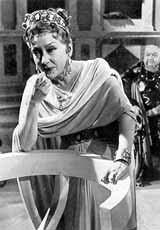 18. Agrippina Minor
18. Agrippina Minor
(often called Agrippina the Younger, same name as her mother, you get how this works by now)
Another of my absolute favourites. This woman had everything: family, power, status. Oh, a few rumours of poison and incest here and there, but who doesn't have a skeleton or two in their closet?
And yes, my fascination for her led to the short story "Julia Agrippina's Secret Family Bestiary" and "The Patrician" and indeed the whole four story collection Love and Romanpunk. This is what happens when I embrace my obsessions.
The thing that came as most of a surprise to me, in writing those stories, was that I couldn't write a sympathetic Livia and a sympathetis Agrippina in the same universe. No matter how much I fictionalised them, they hated each other too much. So Livia has to wait until I have a year or two to set aside in search of The Great Romanpunk Novel, which will have her relationship with Octavian front and centre.
In the mean time, Agrippina gets to slander Grandma with great abandon, and embrace the smugness that comes from having a suite of short stories in her honour. And, you know, being portrayed as a manticore-slaying superhero.
I didn't say the stories were *entirely* historically accurate. If I cause Tacitus to turn in his grave a little, job done.
Agrippina was one of the many daughters of Golden Germanicus and angry, political Agrippina Major. She was the sister of Caligula – and, like their other sister Drusilla, was said to have committed incest with him at a very young age.
(Suetonius and Tacitus really did have far too much interest in other people's sex lives)
Agrippina had an unstable childhood – both her parents died young, leaving her to the mercy of her strict, elderly aunt Antonia. Agrippina was married to someone mostly-unimportant, and had a son, Nero. When Caligula became emperor, Agrippina and Julia Livilla were garlanded with honours and status like their sister Drusilla, but both of them soon fell out with their brother and were exiled.
When Caligula died, Uncle Claudius was put on the throne, and seemed to make a pretty good job of it despite the Matter of Messalina.
Almost as soon as his wife was executed for adultery, Claudius started looking for a replacement. He and his advisors drew up a shortlist of appropriate women. When his eye fell on his 30-something niece Agrippina, recently returned from exile, he threw away the list and went for Totally Inappropriate, Please.
It was illegal to marry your niece, but Claudius changed the law. Marriage to your son's daughter became legal, though marriage to your sister's daughter was still officially incest. (gotta have standards)
Messalina had been specifically denied certain honours as the imperial wife. When her son was born, the Senate had offered her the title Augusta (previously only held by the elderly Livia and Antonia) but Claudius turned it down on her behalf. No thanks, too much honour for such a young and unimportant woman.
Not Agrippina, though. There was no honour too good for her. She was made Augusta lickety split. She also appeared on the state coinage with her husband (sometimes even on the same coin), something that hadn't happened since the pre-imperial days of Antony and Octavia. Why was Agrippina allowed these honours when previous imperial wives hadn't? Well, there is the teeny but important fact that she was descended directly from good old Augustus.
HERS:
Augustus>>Julia>>Agrippina Major>>Agrippina Minor
HIS:
Octavia>>Antonia>>Claudius
Livia>>Drusus>>Claudius
Female bits aside, Agrippina had a better claim to the throne than Claudius himself.
Claudius then adopted Agrippina's son Nero. Which was important, because he was a few years older than Claudius' own son Brittanicus. To the Romans, adoption was exactly the same as a blood relationship (down to the finer points of genetic philosophy, though incest laws don't apply if you want to marry an adopted son to a natural daughter). So Nero had been bumped to prime heir.
 This turn of events has generally been portrayed by historians as a gross injustice, but if you consider Agrippina's bloodline, it actually makes a lot of sense. Nero, as Agrippina's son, had a direct line of descent from Augustus, while the best Claudius or his son could claim were the wife and sister of Augustus. Augustus was the key figure here – none of the later emperors had the same level of imperial kudos.
This turn of events has generally been portrayed by historians as a gross injustice, but if you consider Agrippina's bloodline, it actually makes a lot of sense. Nero, as Agrippina's son, had a direct line of descent from Augustus, while the best Claudius or his son could claim were the wife and sister of Augustus. Augustus was the key figure here – none of the later emperors had the same level of imperial kudos.
Then there's the fact that Britannicus was the son of Messalina. No one ever came out and openly said "Hey, she slept around a lot, maybe he's not Claudius' actual son," because it was irrelevant. By Roman law, once a father acknowledged a baby as his own, he couldn't take that back no matter what information might come to light later. In a worst case scenario, Brittanicus was another adopted son, only one without as fine a pedigree.
So it totally made sense to have Nero as the top heir. Also, he was handsome (if a bit boofy) and generally charismatic. Possibly mad as a cut snake, but that has been challenged in recent years. Nero was no Caligula. If he was loopy, it was simmering under the skin, not out in open sight.
But this isn't a story about imperial men – back to Agrippina! As wife of Claudius she had honour, prestige and was totally a princeps femina in the manner of Livia. As the mother of Claudius' heir, she was likewise laden with honour, status, etc. And life was good.
And then she poisoned Claudius with a dish of mushrooms. Allegedly. And everything went to hell.
Oh, it all seemed pretty damn rosy to start with, when Nero became emperor. Agrippina was Queen of the World, almost literally. Her son honoured her – and not his wife, Claudius' meek daughter Octavia – as the princeps femina, standing at his side as he ruled Rome.
Indeed, since he was only a teenager, it was Agrippina who ruled Rome. She was on the coins, and making all the political decisions. She also made damn sure that she was glorified as a pious imperial widow. Claudius was deified and, like Livia for Augustus, Agrippina was made her late husband's high priestess.
It didn't last. Nero got comfy in the top job, and with that came a mischievous urge to ridicule rather than commemorate his predecessor. Turning Claudius into a joke did not sit well with mummy dearest, as her own personal status was invested in the notion of Claudius the God. She was also concerned that Nero was influenced by his mistresses, and that he treated his wife Octavia appallingly.
Finally Agrippina spoke out, declaring in public that Nero was an embarrassment and unworthy of the position he held. She suggested that his stepbrother Britannicus (surprisingly, still alive at this point) would be a far more appropriate emperor.
Nero promptly poisoned Britannicus. Of course.
Spurred on by his mistress Poppaea, he decided that Agrippina also had to go. He started by exiling her to her riverside estate, but his paranoia grew the longer she was away and resolved that he was going to have to kill her before she killed him first. He didn't want to be accused of matricide (THERE HAVE TO BE STANDARDS APPARENTLY), so decided to kill her as discreetly as possible, so he could never personally be implicated.
Here's where the whole thing turns into something out of a Carry On film.
Nero's first attempt to murder his mother went very badly. He arranged for an elaborate trap to be built into a bed that was delivered to Agrippina; it was designed to collapse on her, but didn't.
Next, he sent a message claiming to forgive his mother for her various crimes against him, and invited her to join him for a religious festival. He provided the boat.
Agrippina set sail for Rome, but the boat started "mysteriously" sinking before they'd got far from shore. What Nero had not taken into account was that his mother could swim. Also, she wasn't stupid. When the sailors called out for survivors, (apparently not all of the ship sank, just the bit that had Agrippina in it), Agrippina's maidservant lost her head and screamed that she was Agrippina, guessing that only the Lady herself would be rescued.
Nero's men rowed out to the maidservant, and beat her head in with oars. Agrippina herself, sensibly silent, swam for the shore.
When Nero got word that his mother was still alive, he gave up on subtlety, and sent a pack of men with big shiny swords.
Here's where it gets rather less like a Carry On film: they slaughtered her.
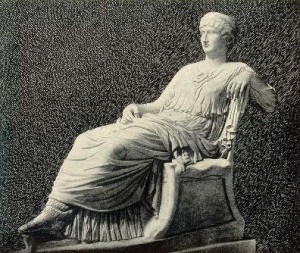 It is said that when she was young, Agrippina received a prophecy that her son would become emperor, and that he would kill her. Her reponse: "Oh, let him kill me, if only he becomes emperor!"
It is said that when she was young, Agrippina received a prophecy that her son would become emperor, and that he would kill her. Her reponse: "Oh, let him kill me, if only he becomes emperor!"
It is said that when the men with swords arrived, and she realised (as the previous attempts had apparently not made her realise) that her son really wanted her dead, she lay down without a murmur and let them do it.
Finally, it is said that when Nero came to the house to view her dead body, he fingered her limbs and talked about how beautiful she was. Icky.
Agrippina was a feisty, powerful woman who manipulated her way through life. There's a statue in the National Museum at Naples that shows her as she might have been towards the end of that life: tired, sad, and waiting for the end. But her ambition for her son knew no bounds, and by this measure she was a major success.
My favourite historical tidbit about Agrippina is that she wrote a book. Many of our surviving historians used her book as a source. Tacitus claimed that this is how he knew she killed Claudius, though I find it highly unlikely that she would have publicly confessed this major crime.
Other sources suggest that it was a book about her family – her mother Agrippina, father Germanicus, great-grandfather Augustus, great grandmother Livia… oh, it sounds like a hell of a book. If any of you get hold of a time machine, that's the item I'm putting in an order for.
But of course, being the impatient wench that I am, I went and wrote my own.
=====
 The Matrons of Awesome series was originally posted on Livejournal (LJ user: cassiphone) in March 2006 for Women's History Month.
The Matrons of Awesome series was originally posted on Livejournal (LJ user: cassiphone) in March 2006 for Women's History Month.
I'm reprinting the (reworked) series as part of my Rock The Romanpunk week in celebration of my short story collection, Love and Romanpunk, which was published by Twelfth Planet Press earlier this year and is now available globally as an e-book as well as a pretty imperial purple print edition. Thanks to Wizard's Tower Bookstore you can also now purchase it for the Kindle.

